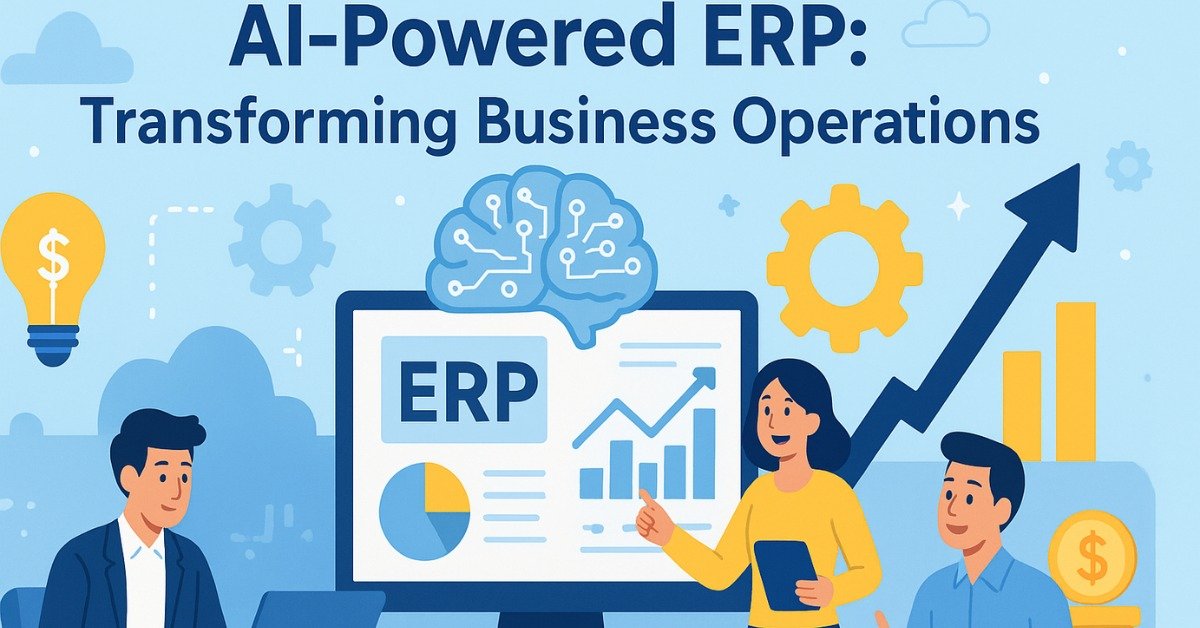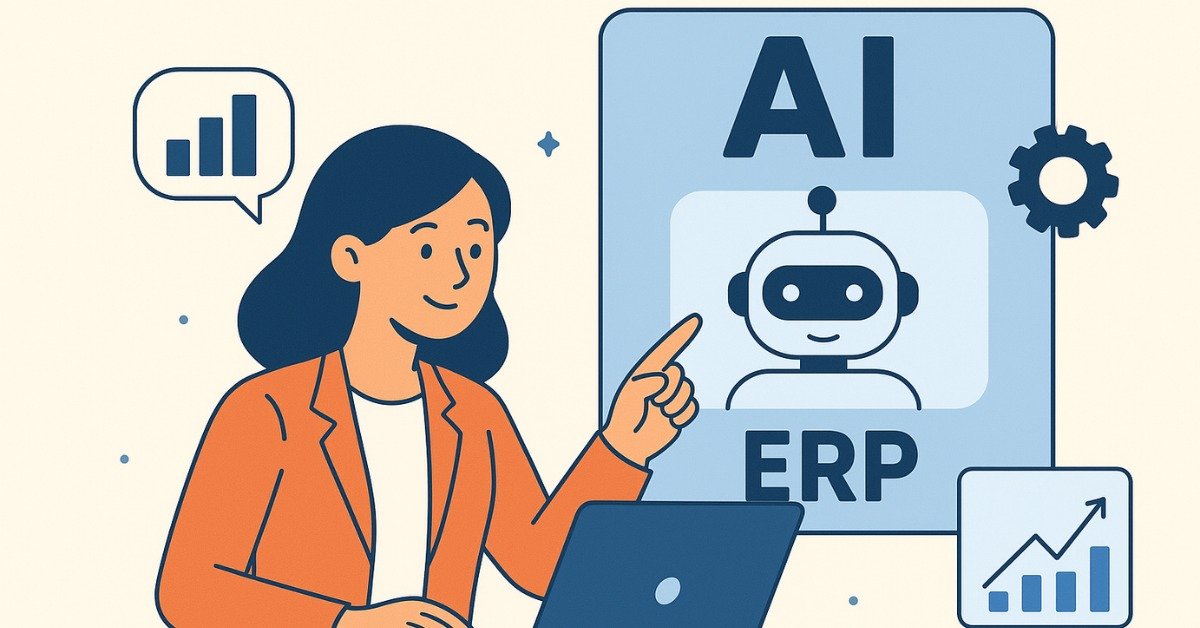Table of Contents
ToggleAI-Powered ERP: Transforming Business Operations
Artificial Intelligence is no longer a futuristic concept. It has already become a critical driver of change in how businesses operate. When combined with Enterprise Resource Planning systems, AI creates an integrated solution that is more intelligent, adaptable, and responsive. AI-powered ERP goes beyond simple automation. It learns from data, predicts outcomes, and helps companies make smarter decisions.
AI-powered ERP is transforming business operations across industries by improving accuracy, streamlining processes, and enabling data-driven strategies. Organizations that embrace AI-powered ERP benefit from increased productivity, reduced costs, and better customer experiences. The integration of AI into ERP systems is not just a technological upgrade; it is a strategic move that reshapes how businesses compete in a digital economy.
ERP systems have always been designed to integrate business processes, but the addition of AI takes their functionality to the next level. AI-powered ERP helps companies move from reactive to proactive operations.
- Predictive Analytics: AI-powered ERP uses machine learning to analyze past data and predict future outcomes. This helps organizations forecast demand, optimize inventory, and reduce supply chain risks.
- Process Automation: AI eliminates repetitive manual tasks such as invoice processing, payroll, and report generation. This frees up employees to focus on higher-value activities.
- Natural Language Processing: With AI-powered ERP, employees can interact with the system using simple voice commands or text queries. This makes accessing reports and data faster and easier.
- Real-Time Decision Making: AI analyzes massive volumes of data in real time, enabling managers to make quick, accurate, and informed decisions.
AI-powered ERP delivers tangible business outcomes. From efficiency to cost savings, its impact is broad and measurable.
- Enhanced Productivity: Employees spend less time on routine tasks and more on innovation. AI-powered ERP improves workflows and reduces delays in critical business processes.
- Cost Savings: Automation and predictive analytics reduce operational waste, optimize resource allocation, and cut down on errors, resulting in significant cost savings.
- Improved Customer Experience: AI-powered ERP ensures faster response times, accurate order fulfillment, and personalized customer interactions, leading to stronger loyalty.
- Business Agility: Companies using AI-powered ERP can adapt quickly to market shifts and regulatory changes because the system provides insights and recommendations in real time.
AI-Powered ERP in Key Business Functions
The strength of AI-powered ERP lies in its ability to improve various business functions simultaneously. It integrates intelligence into every department, making operations smoother and more strategic.
- Supply Chain Management: AI-powered ERP predicts demand fluctuations, optimizes inventory, and improves logistics planning. This minimizes delays and ensures timely delivery.
- Finance and Accounting: Automated reconciliation, fraud detection, and predictive financial forecasting are possible with AI-powered ERP, reducing risks and increasing compliance.
- Human Resources: AI-driven analytics help HR teams with talent acquisition, performance tracking, and workforce planning. AI-powered ERP improves employee engagement and reduces turnover.
- Sales and Marketing: AI analyzes customer data to identify buying patterns, recommend cross-selling opportunities, and personalize marketing campaigns within the ERP system.
Challenges in Adopting AI-Powered ERP
While AI-powered ERP offers immense potential, businesses must overcome certain challenges to realize its full benefits.
- High Initial Investment: AI-powered ERP systems require significant investment in technology, infrastructure, and training. Organizations need to evaluate ROI carefully.
- Data Quality Issues: AI relies on accurate and consistent data. Poor-quality data can result in unreliable predictions and flawed decision-making.
- Change Management: Employees may resist using AI-powered ERP due to fear of job loss or unfamiliar technology. Clear communication and training are essential.
- Integration Complexity: Integrating AI-powered ERP with legacy systems can be difficult. Businesses must plan carefully to avoid disruptions.

Best Practices for Successful AI-Powered ERP Implementation
To ensure success, organizations should follow proven strategies when implementing AI-powered ERP.
- Define Clear Goals: Establish specific objectives, such as cost reduction, efficiency improvement, or customer satisfaction, to measure success effectively.
- Invest in Training: Provide employees with the skills and knowledge needed to use AI-powered ERP confidently and effectively.
- Start Small and Scale: Begin with pilot projects in areas like finance or supply chain, then expand AI capabilities across other functions.
- Monitor and Optimize Continuously: AI-powered ERP systems improve over time, but only if monitored and updated regularly. Continuous optimization ensures long-term benefits.
Future of AI-Powered ERP
AI-powered ERP is evolving rapidly and will continue to reshape business operations. Future ERP systems will not only manage processes but also anticipate business needs.
- Hyper-Personalization: AI will allow ERP systems to tailor workflows, dashboards, and reports to individual user preferences, improving efficiency.
- Autonomous Processes: AI-powered ERP will take automation to new levels, where systems independently handle complex processes such as contract negotiations or dynamic pricing.
- Advanced Predictive Capabilities: ERP systems will provide more accurate forecasts across finance, HR, and supply chain, helping businesses stay ahead of competitors.
- Sustainability Insights: AI-powered ERP will play a key role in supporting sustainability initiatives by monitoring energy usage, reducing waste, and tracking carbon footprints.
Conclusion
AI-powered ERP is transforming business operations by enabling companies to work smarter, faster, and more efficiently. It combines the strengths of ERP with the intelligence of AI to improve productivity, reduce costs, and enhance customer experiences. Businesses that adopt AI-powered ERP gain the agility to adapt quickly, the insights to make informed decisions, and the ability to scale sustainably.
The journey to AI-powered ERP adoption comes with challenges, but with clear goals, proper training, and continuous monitoring, organizations can overcome these barriers. Embracing AI-powered ERP is not just a technological choice but a strategic step toward long-term growth and competitiveness in a digital-first economy.
